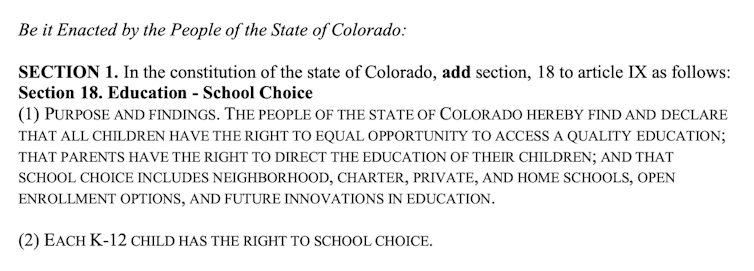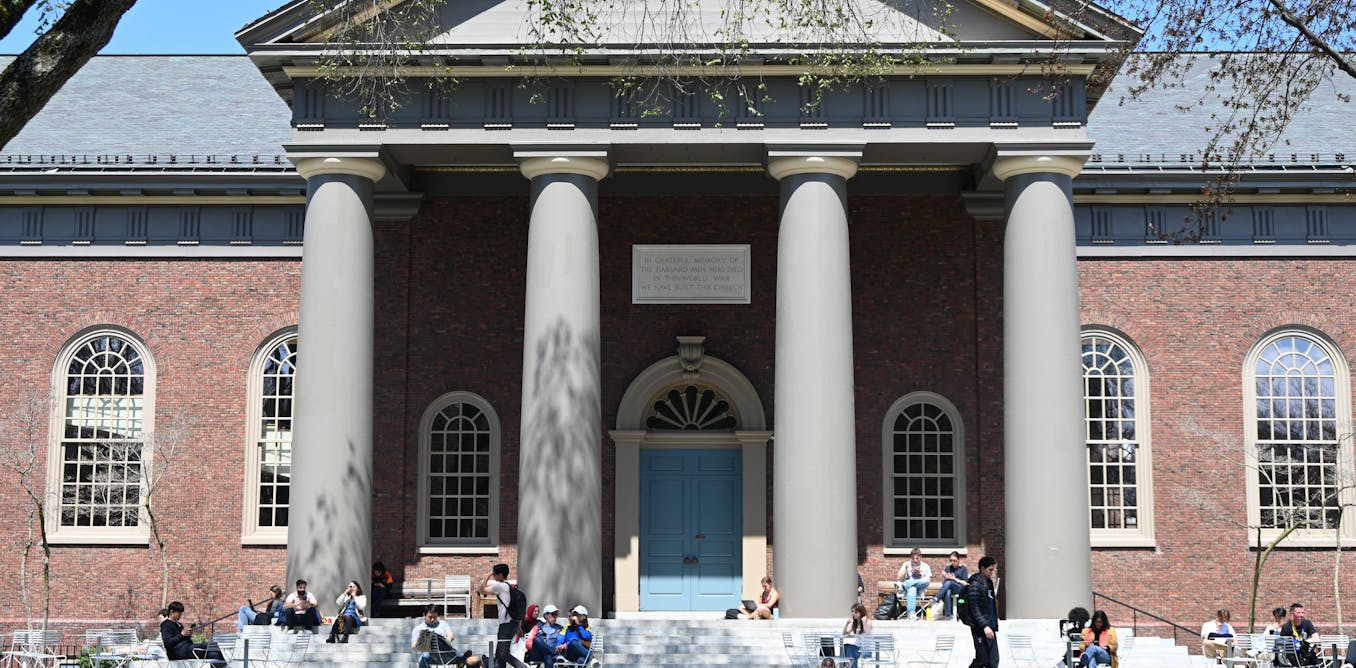In November, Colorado voters will decide whether the state’s constitution should be amended to specify a right to school choice.
But school choice is already guaranteed by state statute and federal courts. So why is this initiative being posed at all?
Even the initiative’s backers acknowledge that Colorado already has “one of the best school choice statutes in the nation.” Moreover, the ability for parents to choose private schools has been affirmed by the U.S. Supreme Court for at least a century.
I have been studying school choice for almost three decades and can say Amendment 80 raises serious questions about the strategies being used by the school choice advocates who put it on the ballot.
School choice in Colorado
School choice options have expanded rapidly across the U.S. in recent years. Currently, it is estimated that over 3.5 million students now attend charter schools, and in the past three years, nine states have approved new programs that provide public funds for private schooling.
In 1993, Colorado became one of the first states to authorize charter schools. Charter schools are publicly funded but privately or independently managed. They are now legal in 45 states.
Likewise, Colorado law enables parents to choose public schools outside their district — an open-enrollment option that is also quite common throughout the U.S., permitted in 43 states.
But a new wave of school choice policies is emerging from conservative legislatures. Several red states, like Utah, Iowa and Indiana, recently created policies to fund universal or near-universal private school choice. These programs – vouchers or education savings accounts – use taxpayer funds to pay for private school tuition and, with education savings accounts, other educational expenses as well. Unlike charter schools, which are technically public schools and accountable to public authorities, these programs funding private schools have few if any regulations on the schools receiving taxpayer dollars.
Colorado is in a different category altogether.
Indeed, Colorado voters have repeatedly rejected ballot measures to implement private school choice. That mirrors voters across the country, who tend to reject these intiatives, often resoundingly.
Moreover, Colorado’s original state constitution explicitly prohibits sending public funds to private schools.
In essence, Colorado is a trailblazer when it comes to funding school choice in the public sector – but not the private sector. Like all Americans, Coloradans have every right under federal law to choose a private school at their own expense.
Ed Andrieski/AP Photo
Who supports Amendment 80
Amendment 80 reflects a familiar political divide when it comes to school choice policies.
Republicans largely support more parental prerogatives to choose schools, including private schools, and fewer restrictions on those schools.
Democrats tend to oppose unregulated choice and programs that fund private schools, and support accountability measures for schools that receive public funds.
There are, of course, exceptions to this partisan divide.
Some Democrats, including Colorado Gov. Jared Polis, who founded two charter schools, have objected to efforts to regulate charters.
Meanwhile, some conservatives, including Christian homeschoolers, have expressed concerns about government involvement in private schooling, which they fear could lead to regulation.
The proposal frames school choice as a child’s right, leading some to worry it will give a student’s wishes legal predominance over their parents’.
Those skeptics may have a point. Rather than push directly for school vouchers, backers of Amendment 80 simply make the seemingly innocuous assertion that school choice is a “right.”
School choice as a ‘right’
The fact that advocates for this measure are framing the issue this way – rather than as an effective taxpayer-funded policy, for example – is telling.
While there are different forms of school choice, like charter and magnet schools, the modern private school choice movement emerged as a way for Southern segregationists to avoid integration.
The movement gained momentum in the 1990s by asserting that choice leads to better educational outcomes, and that it gives low-income students an equitable opportunity to attend better schools.
Those claims have not stood up.
Every rigorous study of statewide voucher programs in the past 10 years has shown that they do not improve student outcomes. In fact, they have led to some of the largest learning losses ever measured — comparable to the losses from the COVID-19 pandemic.
Rather than simply giving low-income students opportunities beyond their segregated schools, charter schools lead to higher levels of segregation.
Additionally, statewide private school choice programs, such as what one might envision arising from Amendment 80, are budget-busters for state treasuries and for rural schools as they channel public funds away from high-need areas to affluent families using these programs.
In light of that track record, it is not surprising to see choice advocates move away from their earlier equity claims and focus instead on “rights” — even when such a right can lead to worse educational outcomes for kids.
But even if the rhetorical strategy around Amendment 80 is clear, the question still stands: Why push to enshrine rights that are already effectively available through both Colorado law and U.S. Supreme Court rulings?

Colorado Secretary of State
Public funds for private schools
Michael Fields, the president of Advance Colorado, the organization that promoted the proposal, noted that the idea is to “preserve” and “protect families’ ability to choose the best educational options for themselves.”
Elsewhere, he said, “It’s really just cementing the school choice laws that we have in Colorado right now into the constitution.”
Essentially he is arguing that Amendment 80 would confirm the status quo in Colorado.
But the actual language of the initiative tells a different story.
Rather than simply affirming an existing right to choose a public, charter or homeschool, the more important issue here is the right to choose a private school.
Of course, this right already exists. Since at least 1925, parents across the U.S. have been guaranteed the right to choose private schools for their children, but at their own expense.
If Amendment 80 passes, I expect we will see the argument that such a right is meaningless without funding to support the choice of private schools. After all, when people talk about the right to public education or health care, the underlying assumption is that there is no cost barrier to exercising that right, which is funded by taxpayers.
Recent rulings by the U.S. Supreme Court suggest Colorado’s prohibition on the use of public funds for “church or sectarian” schools could be challenged in court. Adding a right to private school choice to the state’s constitution through Amendment 80 appears to be designed to provide the basis for such a challenge.
Early voting is happening now in Colorado. Find your polling place here.




